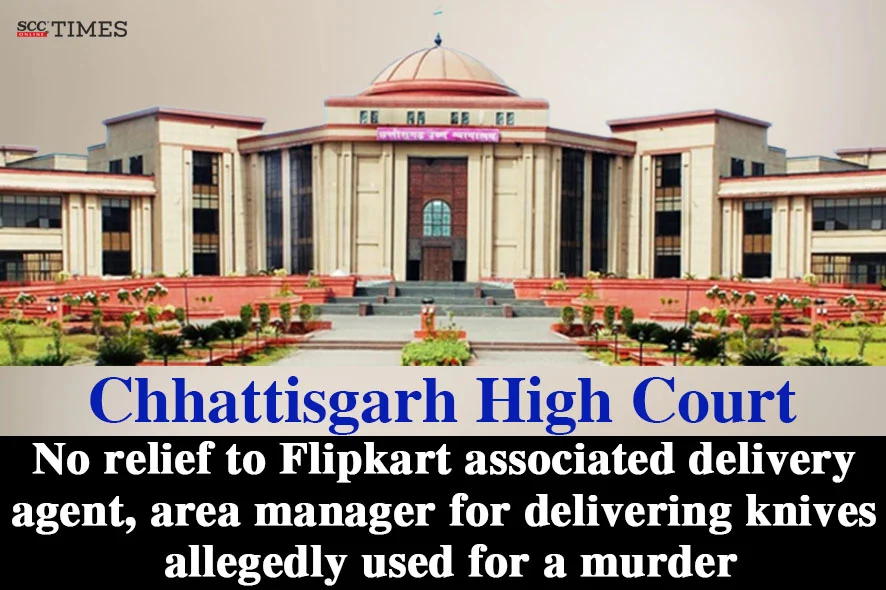Chhattisgarh High Court: In a petition filed seeking quashing of an FIR registered against the accused persons under Sections 125(b) and 3(5) of the Bharatiya Nyaya Sanhita, 2023 (‘BNS’) for delivering a knife that was allegedly used for a murder, the Division Bench of Ramesh Sinha*, CJ., and Bibhu Datta Guru, J., dismissed the petition, holding that the allegations contained in the impugned FIR, taken at their face value, disclosed the commission of cognizable offences.
Background
A murder and robbery were committed by two accused, who allegedly used knives procured through Flipkart Pvt Ltd (‘Flipkart’). The primary offence was registered as FIR No. 291 of 2025 under Sections 109, 103(1), 309(6), and 3(5) of the BNS along with relevant provisions of the Arms Act, 1959. Accordingly, an FIR was filed against the present accused, the Senior Area Manager and the Delivery Service Agent, employees of ElasticRun (‘ER’), a logistics Company engaged in providing delivery services to Instakart Services Private Limited (Flipkart’s logistics subsidiary).
The prosecution contended that the present accused persons were implicated because the delivery personnel ought to have suspected the nature of the goods from the barcodes and packaging, yet they proceeded with delivery, thereby endangering human life through negligent conduct.
The accused contended that their role was strictly ministerial and mechanical, confined to pickup and delivery of sealed consignments without any knowledge of their contents or the criminal intent of purchasers. The Master Services Agreement between Flipkart and ER expressly prohibited tampering with packages, and employees are contractually bound to deliver items intact without inspection.
Analysis
At the outset, the Court reiterated that the jurisdiction to quash a complaint, FIR, or charge-sheet is extraordinary and must be exercised sparingly. Courts ordinarily do not interfere with investigations of cognizable offences. FIRs may be quashed only where allegations, even if accepted at face value, do not prima facie constitute an offence.
The Court stated that the contentions of the accused persons could not be examined at this stage as the adjudication of factual disputes, evaluation of evidence, or assessment of credibility does not fall within the jurisdiction of Section 528 of the Bharatiya Nagarik Suraksha Sanhita, 2023, or Section 482 of the Criminal Procedure Code, 1973. In this regard, the Court placed reliance on Neeharika Infrastructure (P) Ltd. v. State of Maharashtra, (2021) 19 SCC 401, and State of Orissa v. Saroj Kumar Sahoo,(2005) 13 SCC 540.
Based on the material on record, the Court held that it could not be concluded that the criminal proceedings were manifestly mala fide or instituted with an ulterior motive to harass the accused persons. The Court reiterated that FIRs or criminal proceedings can be quashed only in accordance with the parameters laid down by the Supreme Court in a catena of decisions, such as State of Haryana v. Bhajan Lal, 1992 Supp (1) SCC 335, Rupan Deol Bajaj v. Kanwar Pal Singh Gill, (1995) 6 SCC 194, Rajesh Bajaj v. State NCT of Delhi, (1999) 3 SCC 259, and Medchl Chemicals & Pharma (P) Ltd. v. Biological E. Ltd., (2000) 3 SCC 269.
Regarding the reliance placed by the accused persons on decisions granting immunity to intermediaries, the Court held that those decisions could not be accepted for quashing due to the following reasons:
-
Different statutory and factual matrix: The cited cases dealt with intermediary liability in the context of online content or listings. The present FIR involved allegations of physical delivery of dangerous articles used in the commission of murder.
-
Distinguishability on facts: In those cases, due diligence obligations were shown to have been complied with. Here, an investigation was yet to ascertain whether there was any breach of due diligence or negligence.
-
Safe harbour not absolute: Section 79 of the Information Technology Act, 2000 (‘IT Act’) affords immunity subject to conditions; it does not bar investigation where allegations suggest facilitation of a crime or rash/negligent conduct.
Thus, the Court held that the allegations contained in the impugned FIR, taken at their face value, disclosed the commission of cognizable offences. The FIR specifically alleged that the knives ordered by the accused persons through Flipkart, which are prohibited under the Arms Act, were delivered through the logistics chain of ER, where the present accused persons were employed, despite prior communications and warnings from police authorities to e-commerce platforms to desist from supplying such prohibited items.
The Court held that whether the present accused persons had actual knowledge of the contents, whether they acted negligently, and whether safe-harbour protections under the IT Act were available to them, were all matters requiring investigation and could not be conclusively determined at this preliminary stage.
Accordingly, the petition was dismissed.
[Dinesh Kumar Sahu v. State of Chhattisgarh, CRMP No. 2714 of 2025, decided on 01-09-2025]
*Judgment authored by: Chief Justice Ramesh Sinha
Advocates who appeared in this case:
For the petitioners: Devashish Tiwari
For the respondent: Soumya Sharma, Panel Lawyer.








